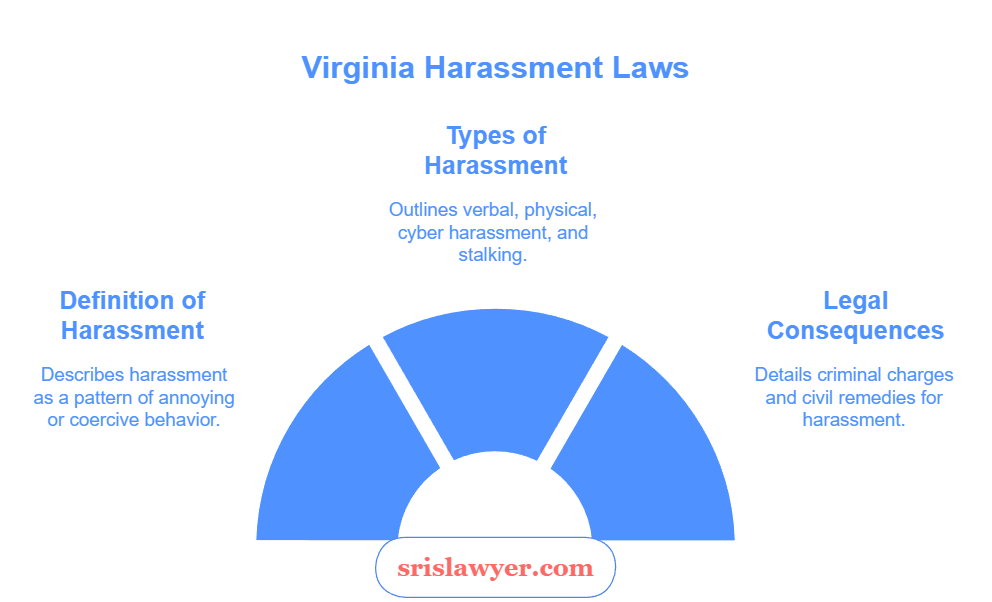In Virginia, the legal framework addressing stalking is designed to protect individuals from unwanted and threatening behavior. virginia harassment laws, is defined as a pattern of conduct that places a person in reasonable fear of death, criminal sexual assault, or bodily injury. The state recognizes the seriousness of stalking and provides legal remedies, including the ability for victims to obtain protection orders.
What Constitutes Stalking in Virginia?
Virginia Code § 18.2-60.3 outlines the offense of stalking. The law characterizes stalking as engaging in conduct directed at another person with the intent to place that person in reasonable fear. This conduct must occur on more than one occasion and can include behaviors such as following, harassing, or threatening the victim. The key elements include the repetition of the conduct and the reasonable fear it instills in the victim.
Protection Orders: An Overview
A protection order, also known as a restraining order, is a legal injunction issued by a court to protect a person from harm or harassment. In Virginia, victims of stalking can seek two types of protection orders: an emergency protective order (EPO) and a preliminary protective order (PPO), which can later be extended into a permanent protective order.
Emergency Protective Order (EPO): An EPO is typically issued when the threat of harm is immediate. Law enforcement officers can request an EPO on behalf of the victim. The EPO can be issued without the stalker being present and lasts for 72 hours or until the next court session, whichever is later.
Preliminary Protective Order (PPO): A PPO can be sought by the victim by filing a petition with the court. The court may issue a PPO if it finds probable cause to believe that the victim is being stalked. A PPO usually lasts for 15 days or until a full hearing is held.
Permanent Protective Order: Following a full hearing where both the victim and the alleged stalker have the opportunity to present their cases, the court may issue a permanent protective order. This order can last up to two years and can be renewed if necessary.
The Process of Obtaining a Protection Order
The process begins when the victim files a petition at the local courthouse. The petition should detail the stalking incidents, providing as much evidence as possible, such as dates, times, and descriptions of the conduct. Once the petition is filed, the court will review the evidence to determine if an EPO or PPO should be issued.
If the court grants a PPO, a hearing is scheduled to consider whether a permanent protective order is warranted. During this hearing, both the victim and the accused stalker can present evidence and testimony. The judge will then decide whether to issue a permanent protective order based on the evidence provided.
Legal Protections Afforded by the Protection Order
- A protective order can include various provisions to safeguard the victim, such as:
- Prohibiting the stalker from contacting or approaching the victim.
- Requiring the stalker to stay away from the victim’s home, workplace, or other specified locations.
Ordering the stalker to cease any form of harassment or threats.
Violating a protection order is a criminal offense in Virginia and can result in additional charges, including potential jail time and fines.
Importance of Legal Assistance
While the process of obtaining a protective order can be initiated by the victim, having legal representation can significantly enhance the chances of a favorable outcome. An attorney can help navigate the legal process, gather necessary evidence, and advocate on behalf of the victim.
Conclusion
Virginia’s stalking statute provides a crucial mechanism for victims to seek protection through the issuance of protective orders. These orders serve as a legal barrier against further harassment and offer victims a sense of security and peace of mind. If you or someone you know is experiencing stalking, it is important to understand the legal options available and to seek assistance from law enforcement and legal professionals to ensure your safety and well-being.
